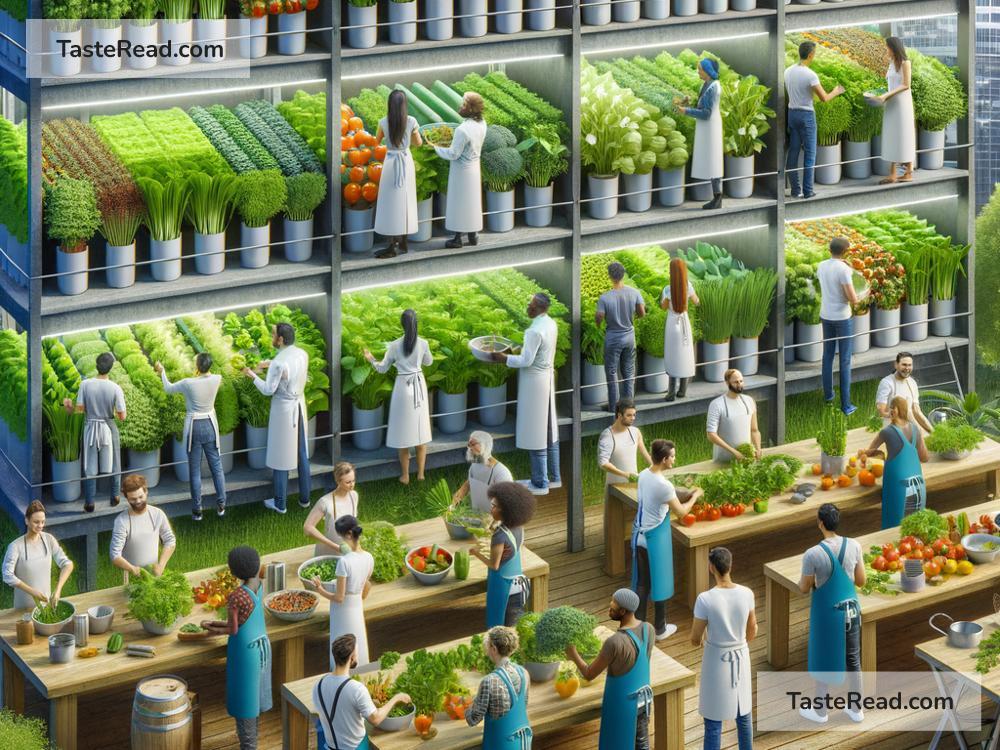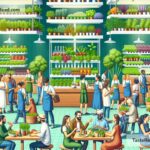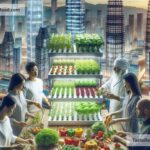The Future of Food and Collaborative Consumption
Food has always been an essential part of human life. However, as the world changes due to population growth, climate change, and technological innovation, the way we produce, share, and consume food is evolving. In recent years, people have started to rethink how food is being made and distributed. One promising trend is collaborative consumption, where communities come together to share resources responsibly and sustainably. In this blog article, we’ll explore the future of food and how collaborative consumption could play a big role in building a better, fairer food system.
The Current Challenges in Food Systems
Right now, our food system faces many challenges. These include wasting food, overusing natural resources, harming the environment, and making food inaccessible to millions of people. Here are some key issues:
-
Food Waste: Around one-third of all food produced globally is wasted. This happens because people don’t consume what they buy, supply chains fail to deliver, or produce doesn’t meet market standards for appearance. Wasted food also wastes energy, water, and labor used for its production.
-
Environmental Impact: Agriculture is responsible for a large part of pollution and greenhouse gas emissions. Industrial farming methods and the overuse of chemicals like pesticides damage the soil, water, and air.
-
Inequality: Despite producing enough food to feed the entire world, millions of people go hungry every day. Wealthy countries have surplus food, while people in low-income communities struggle with food insecurity.
-
Resource Constraints: Farmers depend on water, fertile soil, and stable climates, but these resources are under threat due to climate change and unsustainable farming practices.
Given these issues, it’s clear that we need new ways to produce and share food—ones that prioritize sustainability, fairness, and collaboration.
The Future of Food
The future of food will likely look very different from our current system. Here are some exciting advancements and ideas shaping the future:
-
Alternative Proteins: As the demand for meat grows, scientists are developing alternatives like plant-based “meat” and lab-grown meat. These options require fewer resources and generate fewer emissions compared to traditional livestock farming.
-
Vertical Farming: Vertical farms use stacked layers and controlled environments to grow food in cities. These farms use much less water and land, and they can grow crops year-round.
-
Precision Agriculture: Technology like sensors, drones, and AI is helping farmers grow food more efficiently by minimizing water and fertilizer use while maximizing crop yields.
-
Edible Insects: In some cultures, insects are already a common food. As the environmental benefits of insect farming become clear, it’s likely we’ll see more people adopt them as a sustainable protein source.
-
Personalized Nutrition: Advances in health science and technology could allow people to tailor their diets to their genetic makeup, health conditions, and lifestyle, ensuring they get the best possible nutrition.
-
Food from the Air: Scientists are exploring ways to create food using carbon, electricity, and water—essentially capturing energy from the air. This could revolutionize how food is produced without relying on traditional agriculture.
While these innovations are exciting, the success of the future food system will depend on collaboration and sharing resources.
What Is Collaborative Consumption?
Collaborative consumption is an idea that focuses on sharing goods and services instead of buying everything individually. It’s based on the principle of “access over ownership.” For example, instead of everyone owning their own car, people can use ride-sharing services. When applied to food, collaborative consumption can make eating more sustainable, affordable, and community-focused.
How Collaborative Consumption Can Change Food Systems
Collaborative consumption is already showing up in food culture in the following ways:
-
Community Gardens: Communities are setting up shared spaces to grow fruit, vegetables, and herbs. These gardens offer fresh produce for everyone and teach people about farming and sustainability.
-
Meal Sharing: Apps and platforms allow people to offer homemade meals to others, reducing waste and making dining more social. For example, you might share leftovers or join neighbors in a potluck meal.
-
Food Co-ops: Food cooperatives are member-owned grocery stores that focus on providing affordable, sustainable, and locally sourced products. When people pool their resources, they can access better food.
-
Food Banks and Redistribution: Collaborative consumption also includes efforts to redistribute food that would otherwise go to waste. Supermarkets, restaurants, and farmers donate surplus food to people in need.
-
Shared Kitchens: In some cities, chefs and small food businesses rent shared kitchen spaces instead of owning individual kitchens. This saves money and encourages collaboration.
-
Digital Platforms for Sharing: Apps connecting people with surplus food—like fruits from backyard trees or extra baked goods—are becoming popular around the world.
Why Collaboration Matters for the Future of Food
Collaborative consumption gives people the power to fight food waste, reduce environmental harm, and make food systems more inclusive. By sharing resources and connecting communities, we can ensure food is available to everyone while respecting the planet’s limits.
This model of consumption also encourages stronger social ties. Instead of viewing food as a transaction, collaborative practices turn food into a shared experience. You’re not just eating; you’re connecting with others and building a better world.
Conclusion
The future of food will require both technological innovation and community action. Collaborative consumption offers a powerful framework for making our food systems more sustainable and fair. As individuals, we can support these efforts by sharing, reducing waste, and making conscious food choices. Together, we can build a future where everyone has access to healthy, affordable, and environmentally friendly food—and where sharing and connecting is the norm.
Let’s work together to redefine the way we think about food, ownership, and community. After all, the future is not just about what’s on our plate—it’s about how we get it, share it, and enjoy it together.


